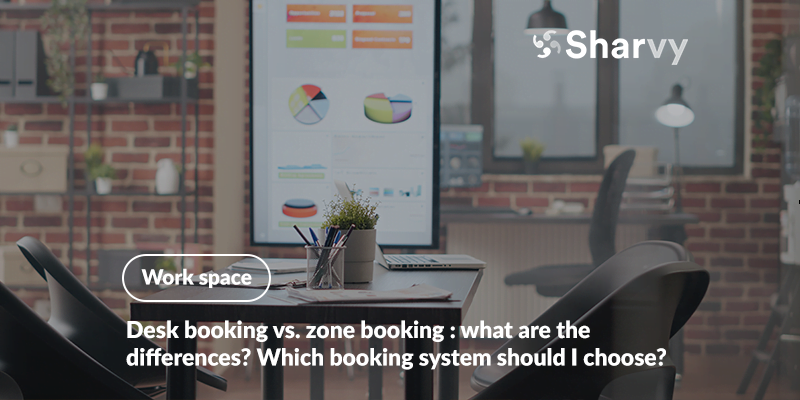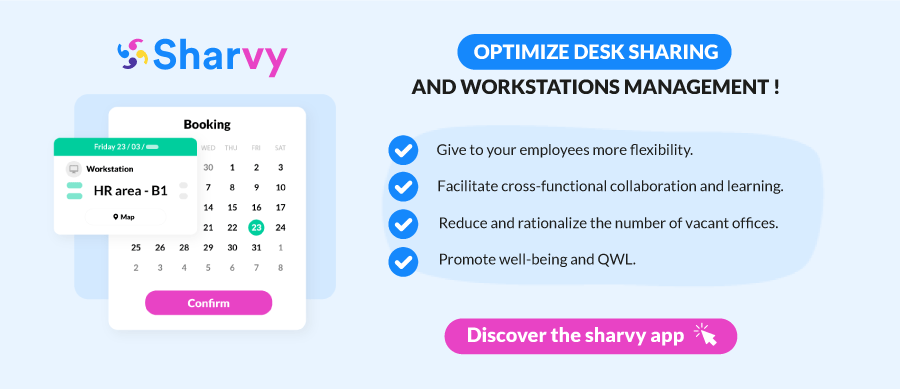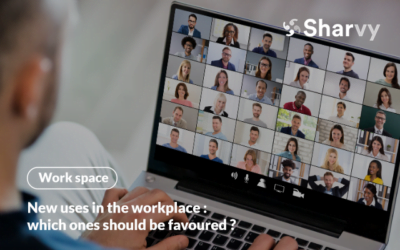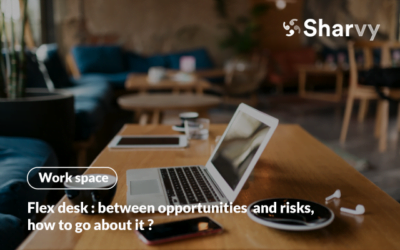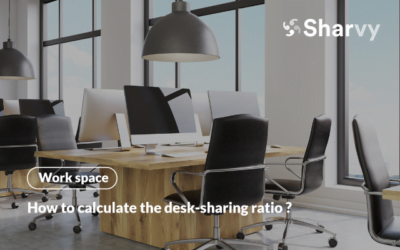What if your office design reflected your vision of work?
At a time when working practices are changing faster than ever, how can you ensure that the organisation of your offices lives up to modern expectations in terms of flexibility and collaboration?
Desk booking & zone booking are emerging as two answers to this question, each embodying a different conception of space occupation.
Far from being mere technical choices, these options are part of a wider reflection on how companies can make the most of their premises to encourage the commitment, innovation & productivity of their teams.
But what is really at stake with each method? Why would a business choose one over the other, and how can this decision transform the employee experience? In this article, we look at the nuances of these two visions of the organisation to help you make the right decision.
A quick review? Desk booking vs zone booking : the definitions!
Desk booking is a practice that allows company employees to reserve a workstation in advance for a full or half day, using a dedicated digital solution such as Sharvy. Once the request has been submitted, the solution automatically allocates a workspace based on a fair algorithm & rules predefined by the administrator. This approach allows various parameters to be taken into account, such as the availability of desks and employees’ preferences (dual screen, open space, callboxes, etc).
Zone booking, on the other hand, allows employees to reserve a specific area within the company’s premises, according to their needs and the nature of their activities. Unlike reserving an individual workstation, this approach is based on allocating a predefined work area – such as one reserved for human resources, another for developers, or another for marketing teams. Each area is designed to meet the specific requirements of the functions it accommodates, providing the most appropriate equipment & environment. This method offers greater flexibility and better management of space, encouraging collaboration between members of the same team, as well as the same function, while adapting to the daily variations in occupancy and the fluctuating needs of employees.
What are the main differences between desk booking and zone booking?
The main differences between desk booking and zone booking lie in the way you want to structure your workspace and meet the needs of your employees.
Unlike desk booking, which allows your employees to reserve a specific office, zone booking guarantees them a (free) office in a specific area of your company. So there is no dedicated desk. Your employees choose a workstation when they arrive.
Dedicated applications, such as Sharvy, facilitate this management by ensuring that bookings do not exceed the zone’s capacity on a given day.
Zone booking gives you the flexibility to reserve dedicated areas for certain activities & teams. This can take the form of zones dedicated to human resources, development teams or creative departments, each equipped and laid out according to its specific requirements. In this way, you can distribute your staff intelligently, and encourage collaboration between members of the same team.
Finally, desk booking is best suited to working environments where stability and order are a priority. Zone booking, on the other hand, is more appropriate if you’re looking to maximise collaboration, flexibility and efficiency in the use of your space.
If you’re curious to find out more, take a look at our case study on how IRD uses Sharvy to facilitate workstation booking.
So, which booking system should you choose between desk booking & zone booking?
To choose between desk booking & zone booking, several criteria need to be evaluated.
1. The size of your company.
Remember that there are no rules, only trends!
Smaller companies, with smaller teams, generally benefit from desk booking because of its simplicity & flexibility, allowing each employee to reserve a workstation according to their individual needs without the need for complex space management.
Larger companies, with a more complex organisation and varied teams, tend to favour zone booking. This approach makes it possible to define specific zones for different departments & projects, optimising the use of space & facilitating collaboration within teams.
Mid-sized companies can consider a hybrid solution, combining the two systems to balance flexibility and organisation. The Sharvy application makes it possible!
2. The needs of your employees & your corporate culture.
These are decisive criteria when choosing your reservation system.
If your organisation values autonomy and individuality, desk booking can offer your employees greater freedom, allowing them to reserve a workstation according to their preferences and work habits.
On the other hand, if your company promotes a strong team culture and encourages frequent interaction between employees, zone booking may be a wiser option, as it encourages the creation of dynamic working areas where your teams can easily interact and share ideas.
3. Configuring your desktops.
Finally, the configuration of your offices plays a crucial role in the choice between desk booking & zone booking.
For example, if your premises are already divided into zones dedicated to specific functions or activities, zone booking allows you to maximise the use of these spaces, by adapting their occupancy to the changing needs of your teams.
However, if your offices are designed around individual workstations, or if you are looking to reduce the number of fixed spaces while maintaining a structured environment, desk booking is more appropriate. It offers optimised management of available space while providing a degree of stability for your staff.
Why choose the Sharvy solution for your organisation?
By adopting Sharvy, you transform your office into a place where organisation and flexibility reign supreme. You optimise the use of space, reduce booking conflicts, and increase the satisfaction of your employees by offering them a working environment perfectly adapted to their needs.
You can turn chaos into harmony, stress into comfort, and space management into child’s play thanks to a range of features offered by the solution, such as :
- Intuitive reservation and release of workstations.
- A real-time view of availability.
- Addition of search criteria (double screen, XXL screen, etc).
- Definition of zones by team to facilitate cohesion and interaction.
- An analysis report and monitoring of the occupancy rate of your workspaces.
- A dynamic floor plan so you can easily find your workstation.
- Integration with your HRIS and third-party in-house solutions.
- Automatic seat allocation, based on priority rules.
- Customisation options to meet specific needs.
If you’d like to find out more, click here for a personalised demonstration!
In conclusion
To conclude with a touch of humour, choosing between desk booking and zone booking is like having to choose between a cupcake and a muffin: both are delicious, but they cater for different tastes!
In the end desk booking is an à la carte service: your employees get a desk with the preferences they specify beforehand (XXL screen, double screen, etc), a bit like ordering the dish of their choice in a restaurant. You book in advance, you get exactly what you ask for, and everything is planned for your comfort.
Zone booking, on the other hand, is like a free buffet. You choose the zone that suits your mood of the day – calm, dynamic, interactive – and you sit down where you feel most comfortable.
So, to make your choice, ask yourself: do you prefer the predictable comfort of a fixed office or the freedom of a flexible space that adapts to your daily needs? The key is to find the option that best satisfies the varied appetites of your team.
Got a question? Check the following FAQ !
Is desk booking easier to implement than zone booking?
Desk booking can be simpler to implement, especially if you have clear and defined individual booking requirements. However, zone booking may require more in-depth planning to define and manage the specific zones within your premises. The ease of implementation will therefore depend on the complexity of your requirements and the configuration of your workspaces.
Can I combine desk booking and zone booking in the same company?
Yes, you can combine the two systems within a company. For example, you can use desk booking to manage individual workstations for employees who come into the office irregularly & zone booking to organise areas dedicated to teams, such as specific projects. This combination allows you to draw on the advantages of both systems to meet the varied needs of your organisation.
Want to find out more? Check out our latest articles to stay up to date!
New uses in the workplace : which ones should be favoured?
Discover five new ways of using your workplaces to meet the changing needs and expectations of your employees!
Flex desk : between opportunities and risks, how to go about it?
In this article, discover all our tips to avoid many disadvantages and make your transition to the flex desk successful.
How to calculate the desk-sharing ratio?
What is the desk-sharing ratio? How do you calculate it? What is its purpose? Is it a good idea to introduce it in your company? The answers and our advice are in this article!
Subscribe to our newsletter!
Resources
Contact us
+44 117 463 6990

